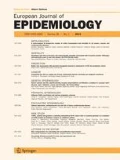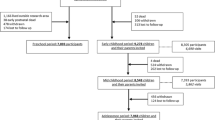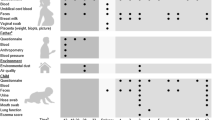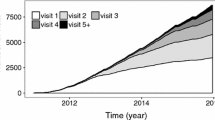Abstract
The Generation R Study is a population-based prospective cohort study from fetal life until young adulthood. The study is designed to identify early environmental and genetic causes of normal and abnormal growth, development and health from fetal life until young adulthood. The study focuses on four primary areas of research: (1) growth and physical development; (2) behavioral and cognitive development; (3) diseases in childhood; and (4) health and healthcare for pregnant women and children. In total, 9778 mothers with a delivery date from April 2002 until January 2006 were enrolled in the study. Of all eligible children at birth, 61% participate in the study. Data collection in the prenatal phase included physical examinations, questionnaires, fetal ultrasound examinations and biological samples. In addition, more detailed assessments are conducted in a subgroup of 1232 pregnant women and their children. The children form a prenatally recruited birth-cohort that will be followed until young adulthood. Eventually, results forthcoming from the Generation R Study have to contribute to the development of strategies for optimizing health and healthcare for pregnant women and children.
Similar content being viewed by others
References
Hofman A, Jaddoe VW, Mackenbach JP, Moll HA, Snijders RF, Steegers EA, et al. 2004. Growth, development and health from early fetal life until young adulthood: The Generation R Study Paediatr Perinat Epidemiol 18: 61–72
Center for Research and Statistics, Rotterdam (COS); http://www.cos.rotterdam.nl; 2005
Burgmeijer RJF, Merkx JAM. Pakket...En hoe pakt het uit: Ouder en Kindzorg tussen wetenschap en praktijk. Nederlands Congres Ouder en Kindzorg. Assen, the Netherlands: van Gorcum; 1999
Statistics Netherlands. Allochtonen in Nederland 2004. Voorburg/Heerlen; 2004
Statistics Netherlands. Standaard onderwijsindeling 2003. Voorburg/Heerlen; 2004
Statistics Netherlands; www.cbs.nl. 2005
Tunon K, Eik-Nes SH, Grottum P, 1996. A comparison between ultrasound and a reliable last menstrual period as predictors of the day of delivery in 15,000 examinations Ultrasound Obstet Gynecol 8:178–185
Morin I, Morin L, Zhang X, Platt RW, Blondel B, Breart G, et al. 2005 Determinants and consequences of discrepancies in menstrual and ultrasonographic gestational age estimates BJOG 112: 145–152
Silva PA, 1990. The Dunedin multidisciplinary health and development study: A 15-year longitudinal study Paediatr Perinat Epidemiol 4: 76–107
Golding J, Pembrey M, Jones R, 2001. ALSPAC: The Avon longitudinal study of parents and children. I. Study methodology Paediatr Perinat Epidemiol 15: 74–87
Berenson GS, 2001. Bogalusa Heart Study: A long-term community study of a rural biracial (Black/White) population Am J Med Sci 322: 293–300
Olsen J, Melbye M, Olsen SF, Sorensen TI, Aaby P, Andersen AM, et al. 2001 The Danish National Birth Cohort: Its background, structure and aim Scand J Public Health 29: 300–307
Smith K, Joshi H, 2002. The millennium cohort study Popul Trends 170: 30–34
Branum AM, Collman GW, Correa A, Keim SA, Kessel W, Kimmel CA, et al. 2003 The National Children’s Study of environmental effects on child health and development Environ Health Perspect 111: 642–646
The Norwegian mother and child cohort study; http://www.fhi.no; 2005
Inskip HM, Godfrey KM, Robinson SM, Law CM, Barker DJ, Cooper C, 2006. Cohort profile: The Southampton Women’s Survey Int J Epidemiol 35:42–48
Acknowledgements
The Generation R Study is conducted by the Erasmus Medical Center in close collaboration with the School of Law and Faculty of Social Sciences of the Erasmus University Rotterdam, the Municipal Health Service Rotterdam area, Rotterdam, the Rotterdam Homecare Foundation, Rotterdam and the Stichting Trombosedienst & Artsenlaboratorium Rijnmond (STAR), Rotterdam. We gratefully acknowledge the contribution of general practitioners, hospitals, midwives and pharmacies in Rotterdam. The first phase of the Generation R Study is made possible by financial support from the Erasmus Medical Center, Rotterdam, the Erasmus University Rotterdam and the Netherlands Organization for Health Research and Development (ZonMw). Vincent Jaddoe, received an additional grant from the Netherlands Organization for Health Research and Development (ZonMw, Grant No. 2100.0074).
Author information
Authors and Affiliations
Corresponding author
Rights and permissions
About this article
Cite this article
Jaddoe, V.W.V., Mackenbach, J.P., Moll, H.A. et al. The Generation R Study: Design and cohort profile. Eur J Epidemiol 21, 475–484 (2006). https://doi.org/10.1007/s10654-006-9022-0
Received:
Accepted:
Published:
Issue Date:
DOI: https://doi.org/10.1007/s10654-006-9022-0




